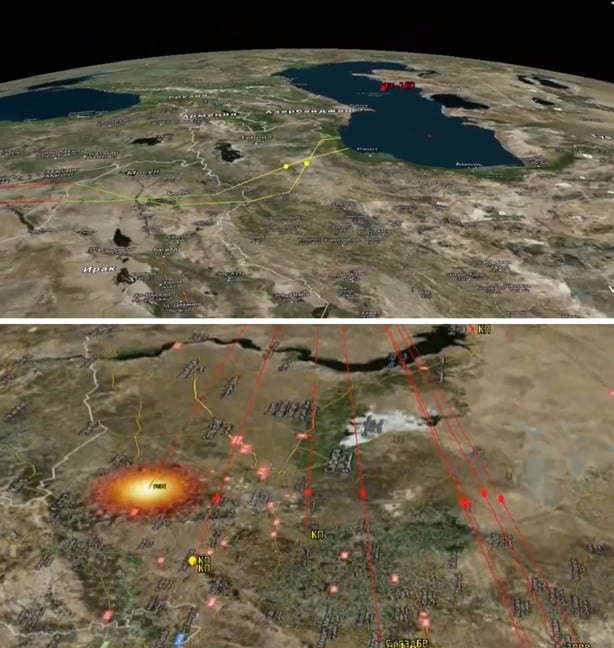Four Russian cruise missiles aimed at targets in Syria instead crashed in Iran, a US official has said, declining to comment on whether there were any casualties.
The official, who spoke on condition of anonymity, said the missiles landed in Iran yesterday, but did not provide details about where they might have landed or whether they caused any damage.
Nor would the official say exactly what type of cruise missiles went down, except to say that they were among a salvo fired yesterday from Russian warships in the Caspian.
The Russian Defence Ministry posted a graphic on its website showing 26 missiles overflying Iran and Iraq before striking inside Syria.

Russia has been conducting air strikes in Syria in defence of the embattled regime of President Bashar al-Assad since 30 September.
The missile launches were in support of a major ground offensive by the Syrian army on several fronts in the war-torn country's west.
US Defense Secretary Ashton Carter said deplored the fact that Russian warships fired the cruise missiles "without warning."
Meanwhile, Syrian troops and allied militia have attacked rebel forces as the government extended a major offensive to recapture territory in the west of the country.
Rebel advances in western Syria earlier this year had threatened the coastal region vital to President Bashar al-Assad's control of the area and prompted Russia's intervention on their ally's side last week.
In a further show of force, the Russian defence ministry said missiles fired from its ships in the Caspian Sea hit weapons factories, arms dumps, command centres and training camps supporting Islamic State forces.
The Russian defence ministry said its air force hit 27 IS targets, including a number of training sites, overnight in the provinces of Homs, Hama and Raqqa, Interfax news agency reported.
Ground forces loyal to the Syrian government targeted insurgents in the Ghab Plain area in the west of the country, with heavy barrages of surface-to-surface missiles as Russian warplanes bombed from above, according to the British-based Syrian Observatory for Human Rights and a rebel fighting there.
It said rebels had shot down a helicopter in Hama province in western Syria. It was unclear if it was Syrian or Russian.
Syria said it had set in train a major military operation in a war that began more than four years ago as an attempt to unseat Mr Assad through street protests and has now killed 250,000 people, sent millions into exile as refugees, and drawn in armed forces from world and regional powers.
Mr Assad's armed forces "have launched wide-ranging attacks to deal with the terrorist groups, and to liberate the areas which had suffered from the terrorist rule and crimes," Syria's army Chief of Staff, Lt Gen Ali Abdullah Ayoub, was quoted as saying by state media.
Lt Gen Ayoub did not say which areas were being targeted. He said new fighting units, including one called the Fourth Assault Corps, had been set up to wage the campaign and the army now held the military initiative.
The Observatory's head, Rami Abdulrahman, said an assault launched by the army and its foreign allies on Wednesday in nearby areas of Hama province had so far failed to make significant gains, however.
"At least 13 regime forces were killed ... The clashes also killed 11 (rebel) fighters," he said in a statement, and the numbers were expected to rise as more casualties were confirmed.
Around 15 army tanks and armoured vehicles had been destroyed or immobilised by rebel missile strikes, Abdulrahman and an opposition activist on the ground said.
Wednesday's operation in Hama appeared to be the first major assault coordinated between Syrian troops and militia on the ground, and Russian warplanes and naval ships.
The Ghab Plain, also in Hama, lies next to a mountain range that forms the heartland of Mr Assad's Alawite sect.
Recapturing it from the alliance of rebel groups, including al Qaeda's Nusra Front which thrust into the area in late July, would help secure MrAssad's coastal heartlands and could provide a platform to drive the rebels back from other areas.
A fighter from the Ajnad al-Sham insurgent group who uses the name Abu al-Baraa al-Hamawi told Reuters that Russian jets had been bombing since dawn.
It was not the first time the Russians had bombed the area, but this was their most ferocious attack, he said, speaking via an Internet messaging service.
Russian air strikes started last week and have mostly focused in areas of western Syria where Mr Assad has sought to shore up his control after losing swathes of the rest of the country to insurgents including the Islamic State group.
Russia says it is fighting Islamic State in Syria. But while the group has been the target of some of its air strikes, it has no foothold in the areas of western Syria targeted in the attacks on Wednesday and Thursday.
Neighbouring Turkey has been angered by violations of its air space by Russian warplanes and NATO said it was prepared to send troops to Turkey to defend its ally.
"NATO is ready and able to defend all allies, including Turkey, against any threats," NATO Secretary-General Jens Stoltenberg told reporters as he arrived for a meeting of the alliance's defence ministers in Brussels which is likely to be dominated by the war in Syria.
At the meeting, Turkey appealed to its NATO allies to shore up missile defences aimed at shooting down Syrian rockets, after Germany said again that it would withdraw its Patriot batteries and the US was set to do the same.
NATO is now waiting for other nations to plug those gaps.

